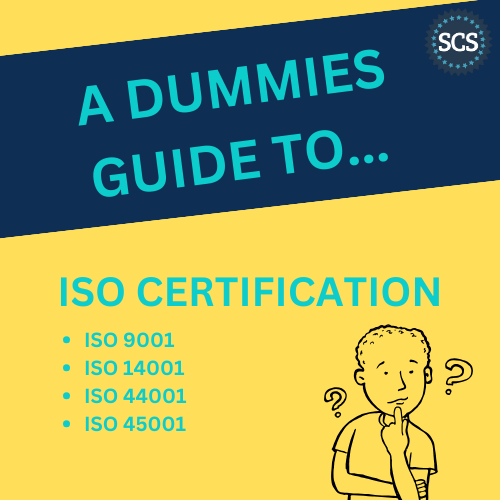
In the world of business, the term “ISO certification” often gets thrown around, but what exactly does it mean? If you're one of those who've heard about ISO certification but aren't quite sure what it entails or how it could benefit your business, fear not! This blog is here to reveal ISO certification, focusing on four key standards: ISO 9001, 14001, 44001, and 45001.
What is ISO Certification?
ISO stands for the International Organisation for Standardisation, a global body that develops and publishes international standards to ensure quality, safety, and efficiency across various industries. ISO certification is a formal recognition that a company meets specific standards set by ISO in areas such as quality management, environmental management, collaboration, and occupational health and safety.
ISO 9001: Quality Management Systems
Let's start with ISO 9001, one of the most widely recognised ISO standards. ISO 9001 focuses on quality management systems (QMS) and outlines requirements for organisations to demonstrate their ability to provide a product and/ or services that meet customer and regulatory requirements, consistently. Implementing ISO 9001, businesses can enhance customer satisfaction, improve processes, and increase efficiency, leading to higher profitability and more competitiveness in their market.
ISO 14001: Environmental Management Systems
Next we have ISO 14001, which deals with environmental management systems (EMS). This standard helps organisations identify, prioritise, and manage environmental risks and opportunities. By implementing ISO 14001, companies can reduce their environmental footprint, comply with environmental regulations, and enhance their reputation as environmentally responsible entities. ISO 14001 certification demonstrates a commitment to sustainability and can attract environmentally conscious customers and stakeholders.
ISO 44001: Collaborative Business Relationship Management Systems
ISO 44001 is a relatively newer standard, compared to the previous standards. ISO 44001 focuses on collaborative business relationship management. This is the least common ISO standard out of the four, with less than 1000 certificates worldwide. It provides a framework for establishing, managing, and improving collaborative relationships between organisations, whether they are customers, suppliers, or partners. ISO 44001 shows trust, transparency, and mutual benefit in business relationships, leading to increased innovation, efficiency, and resilience in supply chains and partnerships.
ISO 45001: Occupational Health and Safety Management Systems
Last but certainly not least is ISO 45001, which addresses occupational health and safety management systems (OHSMS). This standard aims to prevent work-related injuries, illnesses, and fatalities by providing a systematic approach to identifying and managing occupational health and safety risks. Implementing ISO 45001 demonstrates a commitment to ensuring a safe and healthy work environment for employees, contractors, and visitors, leading to reduced absence, improved morale, and enhanced workplace productivity.
Benefits of ISO Certification
Now that you (hopefully) understand the basics of ISO 9001, 14001, 44001, and 45001, let's explore some common benefits of ISO certification for businesses:
Conclusion
In conclusion, ISO certification is not just a technical exercise; it's a strategic investment that can significantly benefit businesses of all sizes and sectors. Whether you're looking to improve quality, minimise environmental impact, increase collaboration, or ensure workplace safety, ISO 9001, 14001, 44001, and 45001 offer valuable frameworks and guidelines to help you achieve your objectives.
So, if you're still on the fence about ISO certification, consider the potential rewards it can bring to your business and take the first step towards becoming an ISO-certified organisation. Remember, in today's competitive business landscape, standing out for the right reasons can make all the difference!
At SCS, we are always here to help. Get in touch with any questions or quesries you may have and les help transform your business together, one certification at a time!
Connor.ogle@systemcertification.co.uk
028 9244 4230